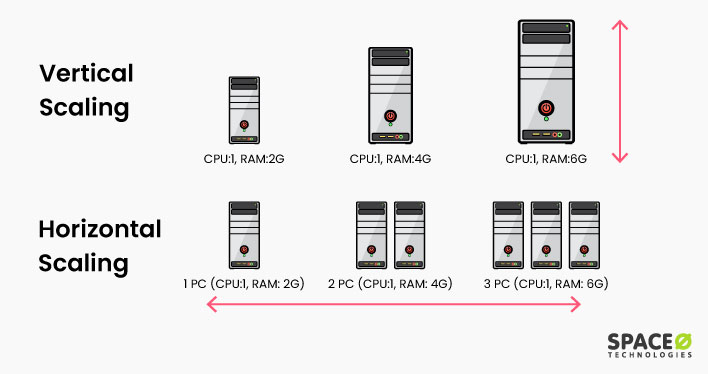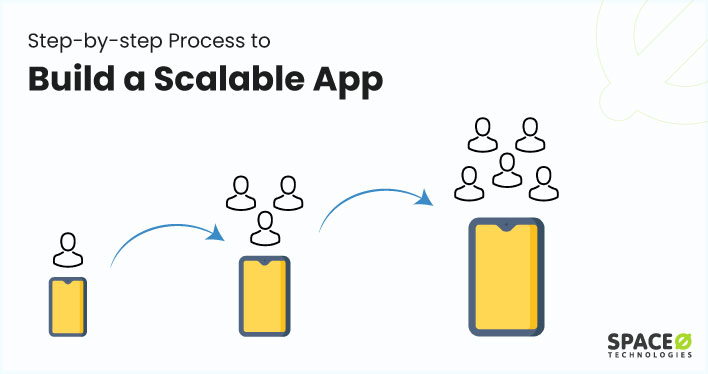- Is your solution lacking the capability to handle more users at a time?
- Do you think your app needs scalability to manage the growing user base?
- Then, why not include scalability in your early development plans to avoid any pitfalls toward the app’s success?
Space-O, being a leading mobile app development company in the USA has already developed 4400+ scalable mobile app solutions. So, we at Space-O understands what goes into developing scalable solution. After discussing with our senior app consultants, we have decided to write a complete guide on application scalability.
In this blog, you will learn:
- What is application scalability?
- Benefits of app scalability
- How do you build scalable mobile apps and mobile apps?
- What are the testing measures taken to check scalability?
Let’s get started.
Table of Contents
What is Application Scalability?
Scalability is about accommodating the growth of the business. The biggest downfall of an unsuccessful application is the inefficiency to scale. No matter what kind of project you aim to launch, your application should be ready to manage the inflow of users.
Getting disconnected from a video call because the application could not handle the load of multiple users. This is a poor user experience as a communication tool.
If you own an eCommerce business events like Christmas or Black Friday can demand more users to shop. If your app is not scalable, your server may face loading issues and users may find it difficult to load a page or process a payment.
This happens when apps are not designed keeping scalability in mind. Let’s check what are the types of application scaling.
What are the Types of Building Scalable Mobile Applications?

Horizontal Scaling
Horizontal scaling means adding more machines to the current infrastructure to meet the expectation. Most of the giants like Google, Facebook, and Amazon are using horizontal scaling. Horizontal scaling is important when there’s a high requirement for services.
The reason why some companies use horizontal scaling is to reduce the load on the existing nodes and increase the capacity.
Vertical Scaling
Vertical scaling is to add more power to the existing system to meet the desired expectation. Vertical scaling is used in small and mid-sized companies to increase input/output operations, and amplify RAM capacity. However, when there is improved performance, downtime increases.
Having said this, do you know why application scalability is needed?
Let’s check the benefits.
Why Does an App Need Scalability?
If you want your app to become successful with a high number of users, app scalability is the key.
Ensure to include scalability when you start with the app development process. Below listed are some of the benefits of considering scalability as a priority.
4 Benefits of Developing Scalable Applications
Check out the below-mentioned 4 benefits of developing scalable applications.
Offers Better User Experience With Less Downtime
When you scale your app, you can continuously improve the user experience with new features. It helps to increase the number of users and run the app smoothly. Think of an MVP app development that enables you to understand the experience of the users. By building mobile and mobile applications, we can adjust the UX and add features as per their feedback. Ensure that the app still works smoothly with the increase of users after the changes.
Provides More Potential for Growth and Higher ROI
Adding new features and functionalities will gradually enhance the app’s performance and increase the number of users. As your project grows with time, the business needs will change. By ensuring that the app is scalable, your business will remain sustainable in the market and the ROI will steadily increase.
Enables Stable Performance to Increase Users
Are you thinking of application migration due to scalability issues? The existing app architecture may work smoothly but the increase in traffic may slow down the working. This may increase the loading time and it is unlikely that the users may stick to the app. Ensure that you build the app with scalability in mind to check the performance issues are taken care of so that when the users increase, the mobile or mobile app works flawlessly.
Customization Becomes Easy With Scalable Applications
Do you want to add a new feature as per customer requests? Or maybe you want to try a new approach to increase user demand. When you build scalable mobile applications you may want to make a few adjustments based on the feedback or business goals. With app scalability, you can effortlessly amend the changes.
Now that you understand the benefits of scalable applications, let us move on to the next section. Learn how to build scalable applications.
Want to Develop a Scalable Mobile App?
Our professional developers will help you develop a scalable application for your business.

How Do You Build Scalable Applications? [7 Factors to Consider]
Do you want to create an app for your business? Building scalable mobile applications helps you develop an efficient mobile app. Below are the 7 simple and easy factors to consider while building a scalable mobile app.
Define the Needs of Scaling to Avoid Unnecessary Expenses
Do not opt to scale your app if it is not necessary. Scalability expenses need to match the growing demand of the users for your app.
Here are the questions you need to ask yourself to understand whether it is time to increase the capacity or not.
- Do you expect user growth sometime soon? Do your data analytics and decide.
- What is the approximate number of users you are wishing for after a certain period?
- How long will servers manage the load of the increasing customers without disrupting the app performance?
- Are there any specific events where you witness the high availability of the users?
By knowing the answers to the above questions, you will get an idea of whether you need more capacity or you already have enough capacity for the increase in users. This information will help you estimate the cost of scaling an app.
Use Metrics to Identity Scalability Challenges
If you have a mobile app already, check what scalability issues are you facing. You can track the scalability using the following metrics:
- Memory utilization: This is the amount of RAM used at a certain unit of time.
- CPU usage: High CPU usage directly indicates that there is a performance issue.
- Network input/output: Networking refers to the time spent on the data transferring from one process to another.
Monitor the Application Scalability With the Right Tools
Now that you have identified which metrics to focus on, you will need the right tool to track them. Use any of the tracking tools like AppDynamics, Scout, AppNeta, Datadog, Dynatrace, New Relic APM, and Raygun to track the metrics. If any of those show high usage, take the results to find out how to implement scalability.
Use Suitable Infrastructure Options for a Scalable mobile App
Do you want to build an app for your business? Using AWS is preferable as many cloud services manage mobile application development. AWS includes infrastructure, storage, servers, networking, middleware, and databases. Many cloud services like Amazon EC2, Amazon DynamoDB, etc., offer auto-scaling with reliability.
Use Caching to Optimize the Code for Scalability
Caching manages frequently used data to reduce the processing time for users to retrieve the data. For example, if your app gets data from API for any transaction. If you save the data in a cache, you need not enter the same details the next time you make any transaction since the data is readily available in the cache.
Choose the Right Database Optimization for Word Scalability
The best way to handle a large number of users is to scale the database horizontally. The type of database you choose depends on the data you store. Well, performance depends on factors that define scalability. SQL and NoSQL are two different databases that help you grow in the future. SQL refers to scaling vertically by increasing the capacity of a single server. NoSQL databases refer to horizontal scaling where you can add more servers to manage the load.
Choose a Suitable Technology Stack for Scalability
If the framework you choose does not provide ease of scale, it is of no use. You will end up adding more features to the application and investing more money in it. For example, VueJS framework offers high-level scalable apps. Businesses can add features after understanding top mobile app development frameworks as per the requirement.
Now that you are aware of how to develop scalable apps, you should also have the knowledge of how to test the scalability. Let’s find out.
How to Test Application Scalability
What happens if your app does not deliver the quality expected or cannot handle the load of increasing users? All the efforts to make an app scalable would fail.
Follow the below 3 testing practices to ensure the behavior of the app under different conditions.
Performance Testing
App performance testing is to analyze the mobile application’s performance. It includes load balancing to understand the stability and reliability of the app.
Load Testing
Load testing refers to adding demand to the app only to evaluate its response. This extensive testing will help you with an idea of how the app is able to perform when used by millions of users. Integrating load balancers will help to manage the response usage and identify bottlenecks of the mobile or mobile application scalability.
Scalability Testing
Scalability testing is a part of performance testing to identify how scalable is your app. Such testing practices will measure the capability of an app. With scalability testing, you can find out the root cause of an app’s scalability issues.
Do you know a few examples that run smoothly even with a huge number of users increasing daily? Well, here are a few scalable mobile application examples.
Want to Hire Developers for Developing Scalable Applications?
Share your requirements with our consultants. Choose developers as per our flexible hiring models. Contact us.
Examples of Scalable Applications
What are the highly scalable mobile apps in the market? After reading these examples you will have a clear idea of why building scalable mobile applications and mobile applications are important.
Dropbox
A file-sharing tool among customers. This app uses the scalable service to manage distributed databases to store more than one million files quickly.
Slack
The standard communication tool used in IT services uses microservices to provide real-time video calling and screen-sharing features to millions of active users. Read the case study on how Slack has overcome scalability issues.
Spotify App
This music streaming app centralizes the metadata of the frequently used artists or singers and makes a similar UI.
Netflix
Netflix uses Cassandra for storing the data, Storm for processing the data, AWS for hosting the services, and so on. You may wonder is how they can handle all the requests at once. Well, it is the auto-scaling strategy they follow by setting up a cluster of computers for auto-scaling. You can read this case study on how Netflix uses innovation for scalability.
Have you now understood the importance of creating a scalable mobile application for your business?
Do you still have a few questions? Let us help you answer them.
Frequently Asked Questions About Application Scalability
Can an already developed application scale?
Yes. Verify the need for scaling and manage the expectations. Apply relevant metrics to identify the scalability challenges and choose the right tools and frameworks. Use suitable infrastructure and the right database for realistic load testing and app scaling.
Is it essential to develop a scalable app even if I own a small business?
If you own a business, it will eventually grow. As your business needs to expand and fulfill the demand of the customers, you will need a scalable app to manage the app usage. Not only for business owners it is important to create a scalable mobile application but even for users. The growing number of app users should not result in server crashes or delays in data loading.
How will you help in developing a scalable application?
We at Space-O Technologies have skyrocketed in developing apps for various industries. Our professionals have thorough knowledge and experience with the latest technologies, and software protocols that help to build a successful mobile or mobile application.
Want to Develop a Scalable Application for Your Business?
Scalability is critical for every application seeking to support a large inflow of users. With Space-O, we provide app consulting where we suggest to take scaling at the initial stages of planning and executing app development.
If you witness an increase in user attention, do not ignore the scalability factor. Consider it a necessary step in your development journey.



